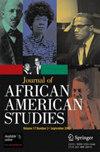IF 0.8
Q3 ETHNIC STUDIES
引用次数: 0
摘要
奥德利·摩尔(生于1898年-至今)1997年出生在路易斯安那州的新伊比利亚,母亲是圣西尔和艾拉·摩尔,她在新奥尔良度过了一个相对幸福的少女时代,直到父母双双去世,她和她的姐妹埃洛伊丝和洛丽塔成为孤儿。1922年,她在新奥尔良加入了马库斯·加维(Marcus Garvey)的“全球黑人改善协会”(Universal Negro Improvement Association, UNIA),此后不久,她就开始了积极分子的生活。摩尔对黑人民族主义的狂热使她在20世纪20年代末移居到哈莱姆区——UNIA总部所在地。当她到达时,UNIA已经解散了,但是共产党已经取代了它的位置,成功地组织了当地的黑人社区。摩尔加入了共产党,并在党内组织黑人工人阶级。到1935年,她是该党上哈莱姆支部的主要招募者和组织者。她在基层的工作导致了全市范围内的党支持的任命,包括管理共产党候选人本·戴维斯在1944年成功竞选纽约市议会席位。在第二次世界大战期间和之后,她与一系列黑人左派组织合作,包括全国黑人大会、民权大会和全国黑人妇女委员会。当20世纪50年代的反共产主义歇斯底里针对共产主义者和进步主义者时,摩尔离开了党,自立更生。20世纪下半叶,摩尔在全美播下了黑人民族主义的种子。摩尔培养了具有性别意识的黑人民族主义,并通过她在新奥尔良的组织——埃塞俄比亚妇女普世协会(UAEW)发起了现代赔偿运动。她还通过革命行动运动、新非洲共和国和黑豹党等黑人权力时代的组织,培养了黑人民族主义和赔偿活动。从20世纪70年代到90年代,摩尔是激进黑人解放运动的母亲和导师,被尊称为“太后”。她是一位广受欢迎的教师和理论家,曾周游全球。例如,摩尔是1972年在坦桑尼亚举行的全非洲妇女会议的主旨发言人,也是坦桑尼亚总统朱利叶斯·尼雷尔(Julius Nyerere)和几内亚总统塞库·图尔塞(Sekou tour本文章由计算机程序翻译,如有差异,请以英文原文为准。
Audley Moore
Audley Moore (b. 1898–d. 1997) was born in New Iberia, Louisiana, to St. Cyr and Ella Moore and had a relatively happy girlhood in New Orleans until the death of both parents left her and her sisters, Eloise and Loretta, orphaned. Her activist life began shortly after when she joined Marcus Garvey’s Universal Negro Improvement Association (UNIA) in New Orleans in 1922. Moore’s fervor for Black Nationalism led her to migrate to Harlem—the location of UNIA headquarters—in the late 1920s. When she arrived, the UNIA had dissipated, but the Communist Party had taken its place as a group successfully organizing the local Black community. Moore joined the Communist Party and worked within it to organize the Black working class. By 1935, she was a lead recruiter and organizer for the Upper Harlem Branch of the Party. Her work at the grassroots level led to citywide, Party-backed appointments including managing communist candidate Ben Davis’s successful campaign for a New York City Council seat in 1944. During and after World War II, she worked with a range of Black leftist organizations including the National Negro Congress, the Civil Rights Congress, and the National Council of Negro Women. When 1950s anticommunist hysteria targeted communists and progressives alike, Moore left the Party and struck out on her own. In the second half of the 20th century Moore sowed the seeds of Black Nationalism across the United States. Moore fostered gender-conscious Black Nationalism and started the modern reparations movement through her New Orleans–based group, the Universal Association of Ethiopian Women (UAEW). She also nurtured Black Nationalism and reparations activity through Black Power–era organizations such as the Revolutionary Action Movement, the Republic of New Africa, and the Black Panther Party. From the 1970s to the 1990s, Moore served as a mother and mentor of the radical Black liberation movement, taking on the honorific “Queen Mother.” She was a sought-after teacher and theoretician who traveled globally. For example, Moore was the keynote speaker at the All-Africa Women’s Conference in Tanzania 1972 and a personal guest of Tanzanian President Julius Nyerere and Guinean President Sekou Touré in subsequent years. She was also member of other Black Nationalist and Pan-Africanist groups such as the All-African People’s Party and the National Coalition of Blacks for Reparations (N’COBRA), among others. She passed away in Brooklyn, New York, on 2 May 1997.
求助全文
通过发布文献求助,成功后即可免费获取论文全文。
去求助
来源期刊

Journal of African American Studies
ETHNIC STUDIES-
CiteScore
0.80
自引率
0.00%
发文量
30
期刊介绍:
The Journal of African American Studies publishes original research on topics of professional and disciplinary concern for the social progress of people of African descent. This includes subjects concerning social transformations that impact the life chances of continental Africans and the African diaspora. Papers may be empirical, methodological, or theoretical; including literary criticism. In addition to original research, the journal publishes book reviews, commentaries, research notes, and occasional special thematic issues. African American Studies is an interdisciplinary field; diverse disciplinary methods and perspectives that include anthropology, art, economics, law, literature, management science, political science, psychology, sociology, social policy research, and others are appreciated.
 求助内容:
求助内容: 应助结果提醒方式:
应助结果提醒方式:


